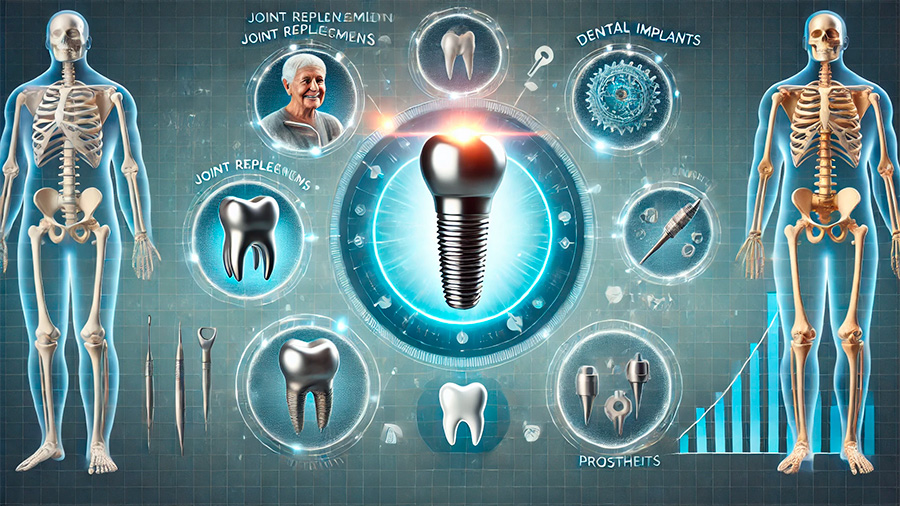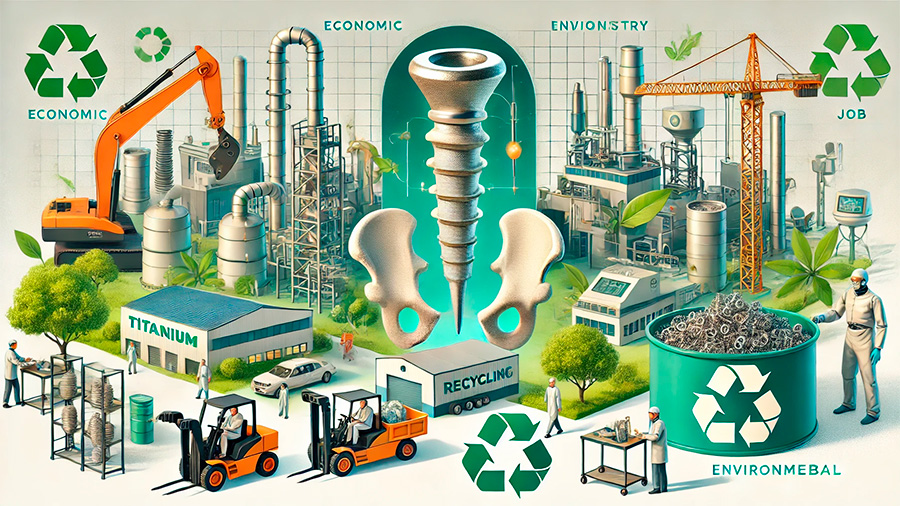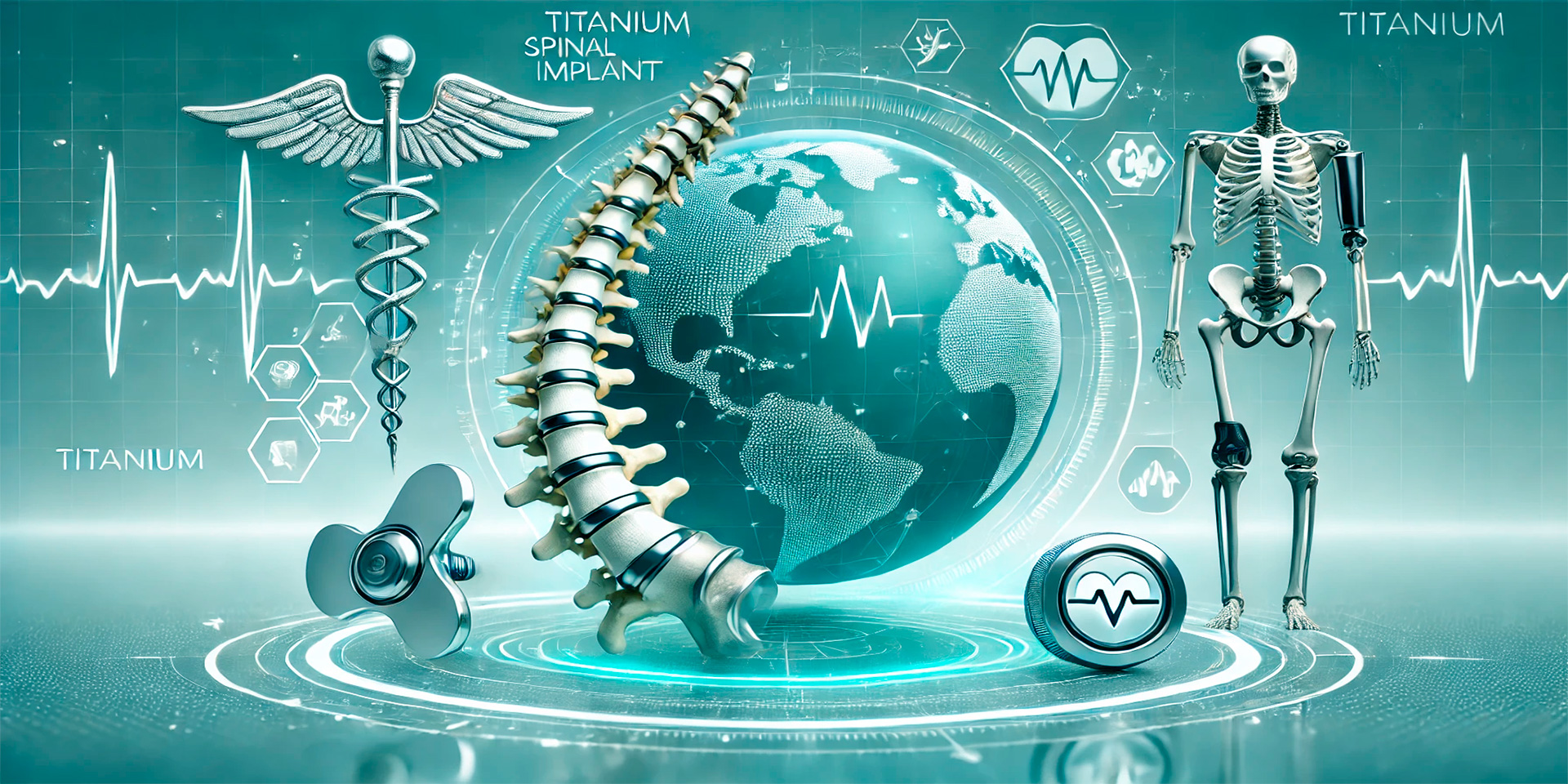Titanium is a highly versatile metal that has found widespread application across various industries, but its most profound impact is in the medical sector. Known for its strength, lightness, and biocompatibility, titanium plays a crucial role in medical implants and devices, significantly contributing to the healthcare sector’s growth. This article explores how titanium is transforming the medical industry, enhancing patient outcomes, and driving economic growth within the healthcare sector.
The Importance of Titanium in Medical Devices and Implants
Titanium’s unique properties make it an ideal material for a wide range of medical applications. It is highly resistant to corrosion, durable, and, importantly, non-toxic to the human body, which makes it the material of choice for implants and surgical devices. Unlike other metals, titanium does not cause adverse reactions when implanted in the body, and it is highly compatible with human tissue, reducing the likelihood of rejection.
1. Biocompatibility and Durability
The biocompatibility of titanium makes it a critical material for medical implants, including joint replacements, dental implants, and bone fixation devices. Its ability to integrate with bone tissue, known as osseointegration, ensures that titanium implants remain securely in place and function effectively over time. This durability and compatibility make titanium essential for long-lasting medical interventions.
How titanium contributes to medical implants:
- Bone integration: Titanium bonds with bone tissue, promoting faster healing and ensuring the stability of implants such as hip, knee, and dental implants.
- Corrosion resistance: Titanium’s resistance to corrosion ensures that it remains functional inside the body without degrading over time, even in harsh environments like joint spaces.
- Strength without weight: Titanium’s low density means it is lightweight yet strong, reducing the strain on the body while maintaining the necessary durability for medical applications.
2. Expanding Applications in the Medical Field
Titanium’s versatility extends beyond implants and prosthetics. Its use in surgical instruments, orthopedic devices, and even dental procedures continues to grow, supporting the development of innovative healthcare solutions. As medical technology advances, titanium’s applications are expanding, contributing to the development of new treatments and medical procedures.
Key areas where titanium is driving growth:
- Joint replacements: Titanium is used in the construction of joint replacements for knees, hips, and elbows due to its strength, lightweight properties, and ability to integrate with bone tissue.
- Dental implants: Titanium is the most common material used for dental implants, offering a stable, long-lasting solution for patients seeking tooth replacement.
- Surgical tools: Titanium surgical instruments, such as forceps and scissors, are valued for their strength, precision, and resistance to corrosion, improving surgical outcomes.
- Spinal implants: Titanium is used in spinal surgery to create rods, screws, and other devices that provide stability and support for patients with spinal injuries or degenerative conditions.

How Titanium Drives Economic Growth in the Healthcare Sector
The healthcare industry, particularly the medical devices and implants sector, is one of the fastest-growing industries globally. Titanium’s contributions to this growth are significant, as it enables the development of cutting-edge medical technologies and solutions that improve patient outcomes. By supporting the creation of high-quality, durable, and effective medical devices, titanium plays a pivotal role in driving the expansion of the healthcare sector.
1. Increasing Demand for Medical Implants
As the global population ages, the demand for medical implants, including joint replacements and dental implants, continues to rise. Titanium’s role in these products has driven the growth of the orthopedic and dental implant markets, creating new opportunities for medical device manufacturers and healthcare providers. With an aging population, there is an increasing need for titanium-based implants that provide long-term functionality and improve the quality of life for patients.
How titanium contributes to market growth:
- Aging population: The demand for joint replacements and dental implants is expected to rise as the global population ages, creating sustained demand for titanium-based medical products.
- Expanding dental care: As dental implants become more common for tooth replacement, titanium’s role in the dental sector continues to grow, contributing to the expansion of dental services worldwide.
- Improved medical procedures: Titanium’s contribution to advancements in medical procedures, such as minimally invasive surgeries and precision joint replacements, drives the demand for modern healthcare solutions.
2. Supporting Innovation in Medical Technologies
Titanium has facilitated the development of new, innovative medical devices and surgical techniques. From the creation of advanced prosthetics to the development of spinal implants, titanium’s lightweight, durable, and non-corrosive properties make it a valuable asset for healthcare innovation. This constant innovation has allowed for the development of more effective and efficient treatments, driving the expansion of medical device markets globally.
Examples of innovation supported by titanium:
- Robotics and minimally invasive surgery: Titanium’s lightweight strength and biocompatibility make it ideal for use in robotic-assisted surgeries and minimally invasive procedures, improving patient recovery times and reducing surgical risks.
- 3D printing in medical devices: Titanium is increasingly being used in 3D printing for custom implants and prosthetics, allowing for personalized treatment options for patients and improving surgical outcomes.
- Next-generation implants: Titanium’s role in the development of next-generation joint and bone implants is crucial in improving the quality of life for patients with conditions like arthritis and osteoporosis.

Environmental and Economic Benefits of Titanium in Healthcare
Titanium’s role in healthcare extends beyond patient care—it also has economic and environmental benefits. As the demand for titanium grows, particularly in medical applications, it supports the global economy by creating jobs, supporting industries, and promoting sustainable practices.
1. Job Creation and Industry Support
The titanium industry, including mining, manufacturing, and research, provides significant economic value through job creation and industry development. As demand for titanium grows in the healthcare sector, it creates new opportunities for skilled workers, researchers, and manufacturers, contributing to economic growth in multiple sectors.
How titanium supports job creation:
- Manufacturing jobs: The production of titanium-based medical devices and implants supports jobs in manufacturing, research and development, and quality control.
- Healthcare sector growth: As titanium-based medical devices become more widespread, they create opportunities for healthcare providers and institutions to offer advanced care and expand services.
- Global trade: Titanium’s use in the global medical device market drives international trade, with countries around the world relying on titanium imports to support their healthcare systems.
2. Sustainability and Recycling
Titanium is highly durable and resistant to corrosion, meaning that medical devices and implants made from titanium can last for many years without degrading. Additionally, titanium is recyclable, reducing waste and contributing to environmental sustainability in the healthcare sector. As recycling technologies improve, titanium’s sustainability will continue to play a role in reducing the environmental impact of medical manufacturing processes.
How titanium supports sustainability:
- Longevity of implants: Titanium implants have a long lifespan, reducing the need for frequent replacements and minimizing waste in healthcare.
- Recycling potential: Titanium’s ability to be recycled without losing its strength or quality supports sustainability in the medical device industry.
- Reduced environmental footprint: By using durable, recyclable materials like titanium, the healthcare sector can reduce its environmental impact while improving patient care.
Conclusion
Titanium is a critical driver of growth in the medical industry, providing essential support for medical implants, devices, and technologies. Its biocompatibility, strength, and durability make it the material of choice for healthcare innovations that improve patient outcomes and support the global economy. As the demand for titanium in medical applications continues to rise, its contributions to healthcare sector growth, job creation, and sustainability will remain essential for advancing modern medicine and improving quality of life for patients worldwide.

